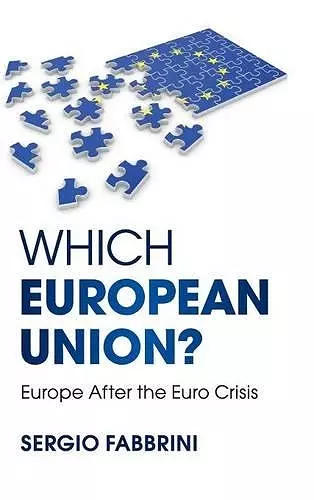Which European Union?
Europe after the Euro Crisis
Format:Hardback
Publisher:Cambridge University Press
Published:26th Feb '15
Currently unavailable, and unfortunately no date known when it will be back
This hardback is available in another edition too:
- Paperback£28.00(9781107503977)

This book asks how the European Union can tackle the constitutional conundrum caused by the Euro crisis.
What impact will the Euro crisis have on the future of the European Union? Sergio Fabbrini argues that a new European political order is necessary based on an institutional differentiation between the EU member states interested only in market co-operation and those advancing towards a genuine economic and monetary union.Sergio Fabbrini argues that the European Union (EU) is made up of states pursuing different aims, rather than simply moving in the same direction at different speeds. He describes the alternative perspectives on the EU (an economic community, an intergovernmental union, and a parliamentary union), that led to multiple compromises in its structure and shows how the Euro crisis has called them into question. The book argues that a new European political order is necessary to deal with the consequences of the crisis, based on an institutional differentiation between the EU member states interested only in market co-operation and those advancing towards a genuine economic and monetary union. Such a differentiation would allow the latter group to become a political union, conceptualised as a compound union of states and citizens, while preserving a revised framework of a single market in which both groups of states can participate.
'Fabbrini brings to bear the skills of a seasoned analyst of comparative politics, a sophisticated knowledge of the federalism literature, and a deep familiarity with the workings of the EU. This book will surely animate a lively debate about where the EU has been and how it can develop in the future.' James A. Caporaso, University of Washington
'In this conceptually sophisticated and historically erudite study, Sergio Fabbrini offers a highly original reinterpretation of the European construct and the structural causes of its current crisis. Supported by outstanding scholarship, his vision of multiple but connected Unions as the best way to escape Europe's current conundrum is bound to become a critical referent in today's debates over the trajectory of the European project.' Kalypso Nicolaïdis, University of Oxford
'Which European Union? is a rare combination of truly comparative breadth and impressive analytic structure which make this book a 'must read' for those interested in the European Union. Its comparative focus on 'multiple separation of powers systems' identifies the EU as belonging to that group of political systems in which the government is a process rather than an institution. Fabbrini thereby suggests a new theoretical approach to explaining why the EU works as it does.' Alberta M. Sbragia, University of Pittsburgh
'The Eurozone needs further integration, not so the common market. A new plural architecture is needed to preserve the distinct features of the two main clusters of the EU and at the same time to give them a common framework. If we don't want to go back, the way forward suggested by this book deserves the highest attention.' Giuliano Amato, former Italian Prime Minister and Vice-President of the Brussels Constitutional Convention
'[Which European Union?] correctly puts an emphasis on the role of Sarkozy and Merkel in dealing with the crisis, while other EU actors were partially marginalised.' Davide Vittori, The International Spectator
ISBN: 9781107103948
Dimensions: 229mm x 155mm x 25mm
Weight: 670g
376 pages